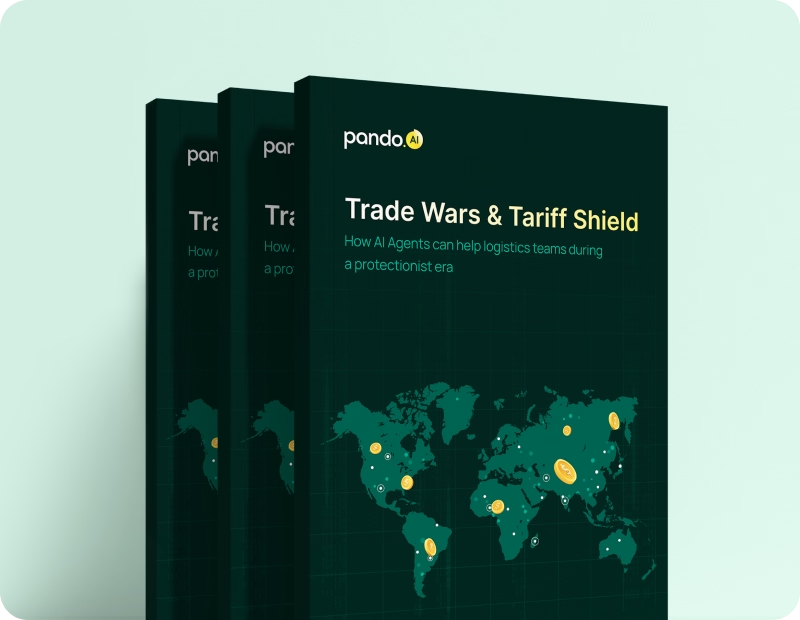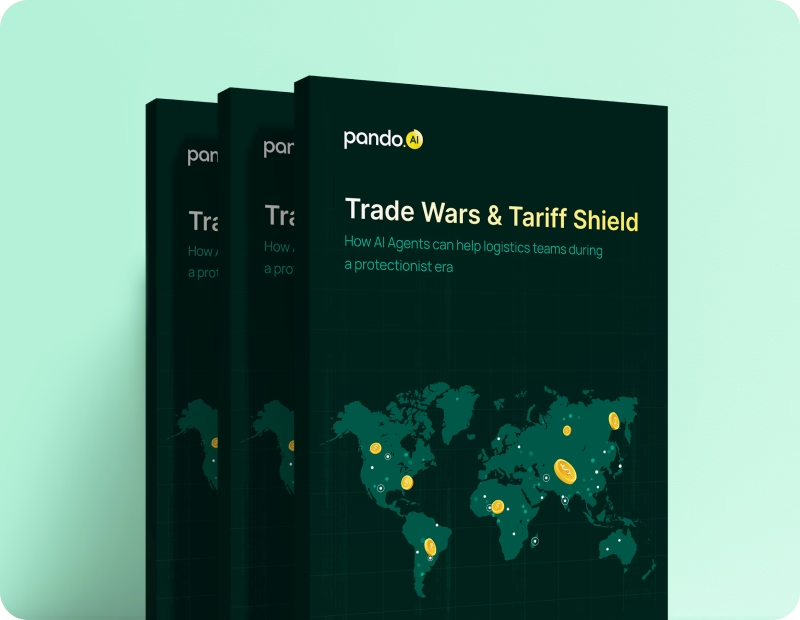-
Products Products
- Industry
- Initiatives
- Resources
- Company
- Book a demo
-
Products Products
- Industry
- Initiatives
- Resources
- Company
- Book a demo
Transforming freight procurement workflows with agentic AI for bid optimization
How next-gen AI agents are redefining efficiency and carrier selection? Get a sneak peek.
Published on December 26, 2024 • 5 mins read
Durga Pratiha

How next-gen AI agents are redefining efficiency and carrier selection? Get a sneak peek.
Creating a bid event might seem like a straightforward process—send out invites, evaluate bids, and pick the best carrier. But as anyone involved in freight procurement knows, it’s rarely that simple. Every bid event demands meticulous planning, custom templates, lane-level analysis, and in-depth vendor evaluations to get the results you’re aiming for.
The problem? Many existing workflows rely on manual effort and generic tools that fall short. Without automation or actionable insights, these processes become time-consuming, error-prone, and costly. Even worse, poor decisions like awarding tenders to the wrong vendors can disrupt service levels, inflate costs, and leave some carriers overburdened while others are underutilized. It’s a recipe for inefficiency.
With fluctuating freight costs, rising demand, and the increasing need for transparency, shippers are under constant pressure to improve procurement processes. This is where AI agents step in to change the game. From automating event setup and recommending the best-fit carriers to benchmark bids in real-time and optimizing load distribution, AI agents take the guesswork out of procurement. They don’t just make the process easier; they make it smarter, helping you save time, cut costs, and improve service quality.
In this blog, we’ll explore the challenges of current tech stacks in bid event creation, discover how agentic AI redefines the process, and share actionable ways to elevate your freight procurement strategy. Let’s get started!
Challenges in bid event creation: Why digitization is no longer enough
Bid event creation is a cornerstone of freight procurement because it directly impacts how efficiently carriers are selected, controls costs, and maintains service levels. At its core, bid event creation ensures that the right carriers are chosen based on precise criteria like pricing, capacity, and service capabilities. A well-executed bid event ensures that procurement decisions are made based on real-time data and actionable insights. Without this foundational process running smoothly, organizations risk overspending, unreliable service, and missed opportunities to optimize their supply chain.
1. Time-consuming template creation
Shippers managing regional shipments during fluctuating demand often find their templates ill-equipped for dynamic needs. Digital tools, though widely used, require tedious manual adjustments, which slow down the bid process. Streamlining this workflow with flexible, responsive templates not only accelerates bid creation but also ensures alignment with real-time demand, enabling you to stay competitive in volatile markets.
2. Inefficient lane management
Many shippers overlook opportunities for consolidation when managing both international and domestic lanes due to static systems. Fragmented lanes lead to inflated costs and lost bargaining power with carriers. Leveraging a smarter lane management approach unlocks economies of scale, improves operational efficiency, and positions you to negotiate better rates based on higher volume commitments.
3. Poor vendor selection
Allowing underperforming carriers to participate in bids often leads to costly inefficiencies, such as delayed deliveries or capacity issues during peak times. Employing advanced vendor evaluation strategies ensures consistent service levels, better alignment with your requirements, and reduced risks of unexpected disruptions, making every dollar spent on freight count.
4. Limited scalability and adaptability
During peak seasons, scaling bid events can become overwhelming, with rigid workflows creating bottlenecks that stall progress. By adopting adaptable, intelligent systems, you can seamlessly manage complex, high-frequency bids. This empowers you to meet tight deadlines, secure optimal carriers, and maintain agility in an ever-changing logistics landscape.
AI-enabled bid event creation: Tailored solutions beyond current tech stacks
Agentic AI refers to advanced systems that act as self-learning, autonomous agents capable of making informed decisions and adapting to complex environments. Unlike traditional AI focused on prediction or content generation, these AI agents continuously improve their performance by learning from real-time data and evolving to meet changing conditions. Let’s explore how AI solutions elevate bid event creation, surpassing the capabilities of current tech stacks.
AI agents make bid event creation a whole lot easier. Instead of spending hours tweaking templates or sorting through vendor options, these smart tools do the heavy lifting for you. They pull in real-time data to see which vendors deliver on time and at the right cost, helping you make better decisions without all the stress. The result? Less manual work, faster results, and bid events that run like clockwork—leaving clunky, outdated systems in the dust.
-
Dynamic template automation: Precision without the repetition
Crafting bid templates is no longer a bottleneck. AI creates customized, freight-specific templates in seconds, adapting seamlessly to diverse needs like hazardous materials or temperature-sensitive shipments. By analyzing historical trends and real-time data, it ensures compliance, reduces errors, and eliminates repetitive adjustments. With this efficiency, procurement teams can focus on refining strategies rather than wrestling with logistics.
-
Advanced vendor evaluation: Moving beyond basic metrics
Selecting the right carrier becomes effortless with AI’s ability to process complex datasets. It evaluates metrics like lane-specific performance, cost patterns, and seasonal capacity, highlighting the best-fit carriers for every scenario. For instance, AI identifies carriers with a proven track record for peak-season reliability, helping you secure cost-effective and dependable partnerships. This precision minimizes risks and enhances service levels.
-
Real-time RFI automation and analysis
The RFI process is redefined with AI, which generates and evaluates RFIs automatically based on event goals and vendor history. It tailors queries to uncover specific vendor strengths, like scalability for high-volume shipments, and scores responses in real-time. This saves hours of manual review, accelerates decision-making, and ensures you’re always equipped with actionable insights.
-
Automated scoring and gating: Ensuring quality vendors
AI raises the bar for vendor selection by automating scoring and filtering. It uses detailed criteria like delivery success rates, cost efficiency, and compliance to exclude underperforming vendors upfront. This guarantees that only high-quality partners will cut, saving time and reducing disruptions. By doing this procurement teams can gain confidence in their selections and achieve consistently better outcomes.
-
Dynamic lane grouping for optimized freight events
Lane management becomes a strategic advantage with AI clustering shipments based on patterns like volume, geography, and cost. It identifies opportunities to consolidate lanes, enhance negotiating power, and optimize freight flows. A shipper handling domestic and international freight can now streamline operations, reduce costs, and improve delivery timelines, unlocking value that static configurations often miss.
Key benefits of AI-enabled bid event creation
Integrating AI into bid event creation offers several compelling advantages that go beyond the immediate process improvements. The primary benefits include:
.jpg?width=2880&height=1486&name=Key%20Benefits%20of%20AI-Enabled%20Bid%20Event%20Creation%20(1).jpg)
Redefining bid event creation with AI agents
Bid event creation demands innovation that transcends basic automation, and AI delivers that advantage. Conventional tools often falter in navigating the complexities of today’s freight procurement landscape. By relying on static processes and limited adaptability, they fail to address real-world challenges like fluctuating demand and the need for precise decision-making. AI-enabled solutions, however, bring dynamic template automation, intelligent vendor evaluation, and real-time data processing into play, making inefficiencies a thing of the past. It’s time to replace rigid frameworks with AI as the foundation for a smarter, more agile procurement strategy.
At Pando, we specialize in transforming the intricacies of bid event creation into efficient and streamlined workflows. Leveraging our hands-on experience, we’ve built solutions that not only address inefficiencies but also unlock new opportunities for smarter procurement. Our approach focuses on delivering measurable outcomes enhanced vendor selection, reduced costs, and greater process reliability to meet the evolving demands of modern freight procurement.
That’s why Pando champions AI agents. We address the real challenges shippers face—tight margins, unpredictable demand, and the pressure to optimize every decision. AI goes far beyond static tools, automating essential tasks like template creation, vendor evaluation, and lane optimization. These capabilities yield tangible results: faster workflows, smarter decisions, and significant cost savings.
Stop settling for processes that can’t keep up. With Pando, you gain more than one solution. You gain the AI-driven intelligence and operational efficiency to revolutionize your procurement strategy and stay ahead in a competitive market.
This version subtly critiques older systems while focusing on AI's transformative power and the expertise Pando brings to the table.
Subscribe to Pando blog and Crossroads newsletter now!
Stay up to date with the latest logistics, transportation, and supply chain tips and news.
Subscribe Here!













